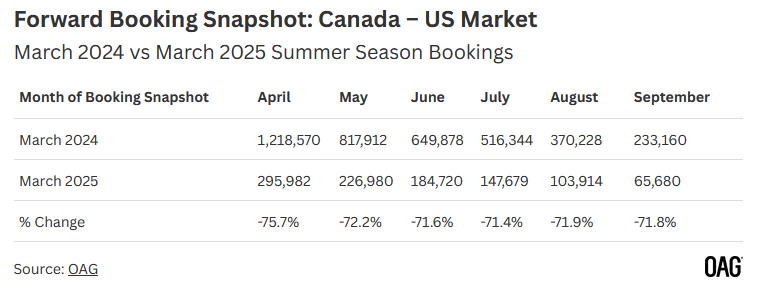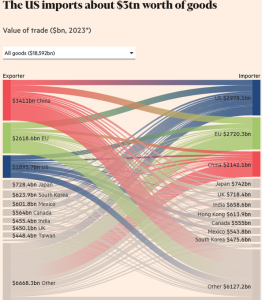 So, Trump’s tariffs are out. He claims they’re half of what each country tariffs the US, but in fact they appear to have been determined by dividing how much the US sells to a country by how much that country sells to the US.
So, Trump’s tariffs are out. He claims they’re half of what each country tariffs the US, but in fact they appear to have been determined by dividing how much the US sells to a country by how much that country sells to the US.
In other words, the more your trade surplus is, proportionally, the higher the tariffs.
This isn’t, on the face of it, necessarily stupid. But… it’s being done very stupidly.
The first problem is the most fundamental: much of what the US buys it can’t make or grow or dig up itself. New capacity takes time, so in cases where the US could in theory make whatever it is, tariffs should either be phased in, or there should be a delay “in two years the tariff will be X%.” As it stands, in a lot of cases, all this is going to do is make Americans pay a lot more.
Then there are things that the US can’t produce itself, or produce enough of. Potash from Canada, for example. The US can’t produce enough. Period. And farmers MUST have it.
So this means that there’s going to be a massive economic shock: prices will go up and/or profits will go down and the US government will need to provide massive subsidies to some industries at the same time as Trump’s budget plan massively cuts revenue due to tax cuts for the rich.
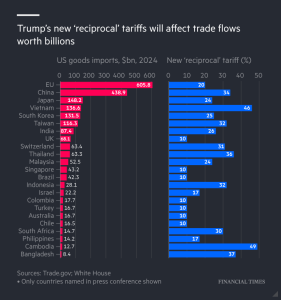 The tariffs on each country should have been individually determined based on what America buys from them, and what America sells to them. If it’s something the US can’t make, or given opportunity costs shouldn’t make (do you want to build more power plants for AI, or use it for aluminum?) then those things shouldn’t be tariffed. And if you’re buying what you really need from them, and can’t make yourself or shouldn’t (Canadian potash and aluminum, for example) then why are you tariffing? The Canadian example is a good one: Canada imports more manufactured goods from the US than it exports to America. Tariffs encourage Canada to buy less goods and re-industrialize, reducing demand for American goods and encouraging American de-industrialization.
The tariffs on each country should have been individually determined based on what America buys from them, and what America sells to them. If it’s something the US can’t make, or given opportunity costs shouldn’t make (do you want to build more power plants for AI, or use it for aluminum?) then those things shouldn’t be tariffed. And if you’re buying what you really need from them, and can’t make yourself or shouldn’t (Canadian potash and aluminum, for example) then why are you tariffing? The Canadian example is a good one: Canada imports more manufactured goods from the US than it exports to America. Tariffs encourage Canada to buy less goods and re-industrialize, reducing demand for American goods and encouraging American de-industrialization.
Instead of selling goods to Canada, made using Canadian primary and secondary resources like wood and aluminum and hydro power, America is encouraging Canada to use its own resources to make its own goods. I mean, as a Canadian I think this is great and I’m very grateful to Trump, but this is stupid, really stupid, of Trump for America.
The second issue is that that one goal is to get foreign companies to buy American goods. But most American goods aren’t price competitive, especially not with China. Add on top of that the retaliatory tariffs which most countries are going to respond with, and the likely end result of this isn’t countries buying more American goods, it’s them buying less.
Now some countries are in a different situation. The EU, for example, is very vulnerable here. They have a massive trade surplus with the US, and it’s in goods and their goods are more expensive than Chinese goods, so they’re fucked: who are they going to sell to if they won’t sell to America?
The EU trade surplus is about 600 billion. America sells the EU more services than vice versa, by about 100 billion, however, so the combined services and trade surplus is around 500 billion. Yet if you drill down to balance of payments overall, it’s closer to 200 billion: the US gets a lot of investment income and other streams from Europe, for example, all those patent and copyright payments, 30% at app stores, etc, etc…
A 200 billion dollar balance of payments deficit is about 1.2% of the EU’s GDP. The correct action for the EU is to hit the US hard on services and income: tax the hell out of that and just get rid of it it in some places. Break the DMCA and set up their own app stores, for example. The screams from Silicon Valley would set off Richter 7 earthquakes.
Let’s look at another country. Japan, has a 68 billion goods trade surplus, about a 25 billion services deficit, and actually gets about 50 billion in misc payments from the US. They’re rolling in it and actually much more vulnerable than the EU because of all that payment income, which is easily disrupted. It’s hard for them to retaliate and not come out hurting bad. But there are reports they’re coordinating their response with South Korea and China, and if true, it makes sense, since they have little leverage alone.
China’s trade surplus with the US is now about 1.8% of GDP. Most Americans think it’s still 2008. It’s not. China will be fine and that’s why their official response has been, in essence, “if you want a trade war, let’s have a trade war.”
Generally speaking the correct response for most countries (but not Japan!) is going to be to go after payments: copyright, patents, app stores and so on, and to tax services.
And this leads to third issue: hitting everyone at once. This allows coordination. If the US had just hit a few countries, everyone else would keep their heads down and hope to be ignored. One country, alone, breaking patents say, or getting rid of DMCA compliance and breaking US app stores, would be crushed. But if it’s done in a coordinated fashion, the US is toast. They can’t sanction everyone, the US financial system will just be treated as damaged and routed around. A universal clearing currency is NOT needed. In fact, for a variety of reasons, it’s one of the worst things possible. Make the deals in local currencies. Done.
Additional add-ons to all of this include the probability of a lot of free capital flows going away. Countries that want to re-industrialize with domestically controlled supply chains, and many now will, need to keep capital at home and the retaliation against the US is going to be against a capital flow/investment system which has, with a few exceptions like Japan, mostly favored the US.
I can’t even imagine how much US property in other countries is likely to wind up forced to sell to locals, or even nationalized outright.
All of this leads to the fact that this will speed up the loss of dollar privilege, and with the loss of dollar privilege and everyone reluctant to sell to America, well, there’s no way that the US standard of living doesn’t get hit hard.
There’s a lot more to say on this. The US is counting on countries needing to sell to it. The Chinese have far more manufacturing capacity than anyone else and a cheaper cost structure. This leaves places like the EU fucked, hard. They can’t really sell to the US profitably. They can’t sell to China because their goods are too expensive. They don’t have a lot of resources to sell except food.
The correct response is to move to internal demand and collapse the cost structure (rent, housing prizes, all monopoly pricing, etc…) but neoliberal policies don’t allow that, so they’re going to try military Keynesianism, but that won’t work well either.
Truly screwed if they don’t get their heads out of their asses and ditch neoliberal bullshit, start taxing the rich, and figure out their energy situation.
But, they, they have it coming.
Long story short: the US is going to be hit by a huge inflationary shock, a decline in standard of living and, unless other countries are stupid, lose most of its overseas rentier monopoly income. The EU is in for a world of hurt, but has options. China will feel it, but they’ll be fine, they don’t need the US as a market any more.
In the longer term this might lead to improvements in the US economy: it will force reshoring, it’s just doing it in the stupidest way possible. But the US risks winding up in semi-autarchy, with an oligarch controlled economy, authoritarian but ineffective politics (think Yeltsin) amid a huge collapse of standards of living, even as it destroys its scientific and academic communities.
The road back will be a hard one and the suffering in between will be massive. And all this assumes that the political problems in America don’t boil over into civil or serious foreign wars.
Americans aren’t going to take a one-third reduction in their standard of living well, especially when so many of them are just a few hundred dollars a month away from homelessness.
Welcome to the end of the American century.
You get what you pay for. This blog is free to read, but not to produce. If you enjoy the content, donate or subscribe.
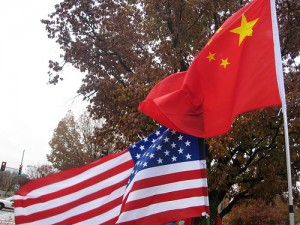

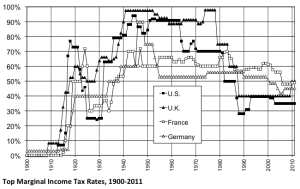
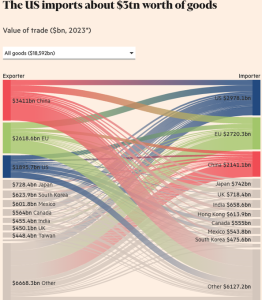 The final part of the economy is what you can get from other nations. Call this the external economy. Does someone else make it, will they sell it to you, can you afford it? Most of the time countries won’t sell other countries nukes, for example, and for much of history countries tried not to sell other countries the knowledge required to make advanced techs. When they didn’t prevent this, they paid big time: Britain was de-facto subjugated by America and America is now losing its Empire.
The final part of the economy is what you can get from other nations. Call this the external economy. Does someone else make it, will they sell it to you, can you afford it? Most of the time countries won’t sell other countries nukes, for example, and for much of history countries tried not to sell other countries the knowledge required to make advanced techs. When they didn’t prevent this, they paid big time: Britain was de-facto subjugated by America and America is now losing its Empire. So, Trump’s tariffs are out. He claims they’re half of what each country tariffs the US, but in fact they appear to have been determined by dividing how much the US sells to a country by how much that country sells to the US.
So, Trump’s tariffs are out. He claims they’re half of what each country tariffs the US, but in fact they appear to have been determined by dividing how much the US sells to a country by how much that country sells to the US. The tariffs on each country should have been individually determined based on what America buys from them, and what America sells to them. If it’s something the US can’t make, or given opportunity costs shouldn’t make (do you want to build more power plants for AI, or use it for aluminum?) then those things shouldn’t be tariffed. And if you’re buying what you really need from them, and can’t make yourself or shouldn’t (Canadian potash and aluminum, for example) then why are you tariffing? The Canadian example is a good one: Canada imports more manufactured goods from the US than it exports to America. Tariffs encourage Canada to buy less goods and re-industrialize, reducing demand for American goods and encouraging American de-industrialization.
The tariffs on each country should have been individually determined based on what America buys from them, and what America sells to them. If it’s something the US can’t make, or given opportunity costs shouldn’t make (do you want to build more power plants for AI, or use it for aluminum?) then those things shouldn’t be tariffed. And if you’re buying what you really need from them, and can’t make yourself or shouldn’t (Canadian potash and aluminum, for example) then why are you tariffing? The Canadian example is a good one: Canada imports more manufactured goods from the US than it exports to America. Tariffs encourage Canada to buy less goods and re-industrialize, reducing demand for American goods and encouraging American de-industrialization.